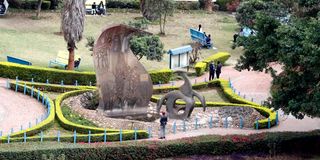Milestone as President Ruto to unveil Kenya’s first virtual varsity

The ‘Fountain of Knowledge’ at the University of Nairobi. President William Ruto will today award a charter to the Open University of Kenya.
History will be set in two weeks when President William Ruto awards a charter to establish the first open university in Kenya following its approval by Parliament early this month.
The charter for the Open University of Kenya (OUK) will grant the institution authority for its operations. Once that is done, the first batch of students will be admitted in September, as earlier planned, and the government targets to enrol 7,100 students in the first intake.
The report on the draft charter was presented to Parliament by the Leader of Majority, Kimani Ichung’wah, following recommendations by the Delegated Legislation Committee and approval by the Attorney-General.
The Commission for University Education (CUE) had earlier approved recommendations for the establishment of the OUK during a special meeting of its board held on June 7, 2023. They were based on institutional inspection conducted on June 2 and 3, 2023 at the temporary site of the OUK at the Nacosti Building.
“The commission in its deliberations appreciated the uniqueness of the proposed Open University of Kenya, being the first university [in Kenya] to be established without being mentored by an existing university, hence lack of a governing organ to incur expenses,” the letter signed by the CUE chief executive Prof Mike Kuria reads.
“The purpose of this letter is therefore to convey the resolution of the commission, to your office and request you to convey the same, upon your satisfaction and approval of Parliament, to His Excellency the President for consideration for award of charter to Open University of Kenya,” reads the letter.
The Technical Working Committee of the OUK, which is chaired by Prof Ezra Maritim, also submitted its progress report to Education Cabinet Secretary Ezekiel Machogu on May 26, 2023.
Mr Machogu is now expected to present the approvals to Dr Ruto to award the charter which will officially establish the first open university in Kenya. It will be temporarily hosted at the Nacosti Building before moving to its permanent home at the Konza Technopolis.
“Construction works are going on at Konza Technopolis,” Mr Machogu told ‘Nation’.
The charter will spell out the senior staff requirements. The chancellor of the university will be the President or he can also appoint one if he deems it fit.
Unlike other conventional public universities, the President will appoint the chair of the council. However, the vice chancellor will be appointed by the CS for Education, on recommendation of the council. The rest of the structure of the OUK will take the form of conventional universities.
The university was allocated Sh270 million in the 2022-23 national budget where Sh20 million was in the printed estimates and Sh250 million in Supplementary I. The funds were for setting up the OUK, including curriculum development, construction at Konza, development of the cloud servers and accreditation by CUE.
“A budget of Sh1.86 billion has been proposed for the first year of operation of the OUK to meet the bulk of the initial costs towards establishing physical facilities, ICT and support, design, production, acquisition of learning/teaching materials and learner support services,” reads part of the technical report.
Six undergraduate and two postgraduate programmes have been developed and approved. These are Bachelor of Science in Cyber Security and Digital Forensics, Bachelor of Technology Education, Bachelor of Science in Business and Entrepreneurship, Bachelor of Data Science, Bachelor of Economics and Statistics and Bachelor of Science in Agri-technology and Food Systems.
The two postgraduate programmes are Postgraduate Diploma in Leadership and Accountability and Postgraduate Diploma in Learning Design and Technology.
Students at the university will also undertake the following common courses: climate change and sustainability, global citizenship, ethics and social cohesion, philosophy, psychology and basic research.
According to a legal officer at the ministry Joshua Wabwire, the OUK will also be expected to build the capacities of other universities in open and distance learning. Students who enroll at the university will be eligible for education loans from the Higher Education Loans Board. Mr Wabwire explained that the tuition fees will vary depending on the modules an individual chooses to study.
To qualify for admission, the technical committee has proposed various academic pathways but it also includes recognition of prior learning, a first for Kenyan universities. The recognition of prior learning may be considered with respect to workplace training of two years, work experience in a relevant field of two years or short courses in the relevant field.
At the same time, Dr Ruto is today also expected to commission the Sh1.5 billion Kimugu water project in Kericho town. The project is jointly funded by the Kenyan and German governments and delayed for the past 28 months, has finally been completed.
“It is true that the President will commission the Kimugu water project in Duka Moja area which will benefit the people of Kericho County. After a long wait, the water shortage in Kericho town is expected to ease,” Governor Erick Mutai told Nation by phone.
The 50-kilometre pipeline project is expected to produce 13 million litres of water per day and benefit 200,000 households in Ainamoi, Belgut and Kipkelion East constituencies, Dr Mutai said.
Additional reporting by Vitalis Kimutai





